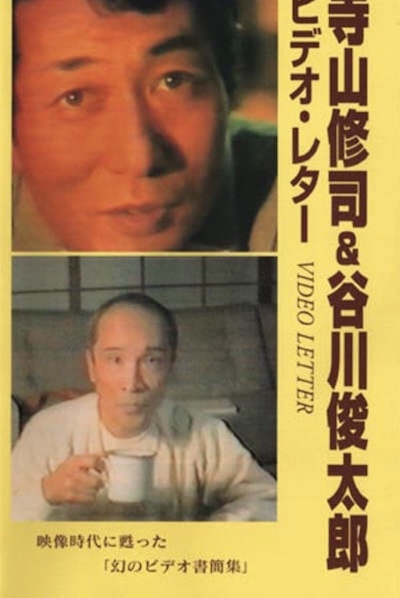

A surreal, isolated village sees its inhabitants gradually leave behind their mutual traditions and superstitions as they leave for the city. Among them are two cousins who love each other and who get into a quarrel with other villagers.Read More »


A surreal, isolated village sees its inhabitants gradually leave behind their mutual traditions and superstitions as they leave for the city. Among them are two cousins who love each other and who get into a quarrel with other villagers.Read More »


Quote:
This remarkable compilation follows an exchange of video letters that took place between Shuji Terayama and Shuntaro Tanikawa in the months immediately preceding Terayama’s death. It can be thought of as a home video produced by two preeminent poets and inter-laid with highly abstract philosophizing, slightly aberrant behavior and occasionally flamboyant visuals.Read More »


A girl loves an older man. He demands that she goes in a brothel, as evidence that she loves him.
Shuji Terayama adapted his 1981 film, The Fruits of Passion, from the eponymous Pauline Reage’s sequel to her well regarded book, The Story of O. However, ‘adapted’ is used very loosely in this instance, as Terayama uses the opportunity to completely reshape the structure of the novel, and use only it’s themes and characters to create a story that is uniquely his. According to the credits, the text of the narration and O’s dialogue itself was taken directly from the short novel, but everything else is pure Terayama.Read More »
Shuji Terayama and J.A.Seazer’s phantasmagoric folk-psych-symph-prog-rock opera. Historical Tenjo Sajiki performance from 1978. A brief synopsis (for a somewhat different version of the play) is given below. Much of the symbolism of Shintokumaru is shared with Terayama’s earlier masterpiece motion picture Pastoral: to die in the country (also known as Pastoral hide-and-seek).Read More »
Shuji Terayama adapted his 1981 film, The Fruits of Passion, from the eponymous Pauline Reage’s sequel to her well regarded book, The Story of O. However, ‘adapted’ is used very loosely in this instance, as Terayama uses the opportunity to completely reshape the structure of the novel, and use only it’s themes and characters to create a story that is uniquely his. According to the credits, the text of the narration and O’s dialogue itself was taken directly from the short novel, but everything else is pure Terayama.Read More »

Quote:
In mid-career, while he is on a winning streak, and in the middle of a fight he is winning, a young boxer is revolted by the violence of the game. He allows himself to be beaten up and quits the match and the sport. He also leaves his wife and child and lives alone with his moth-eaten old dog, all the while losing his sight. Years later, he is hunted down by a young man who is ambitious to become a prize-winning boxer. Persistence pays off, and he eventually persuades the ex-boxer to be his manager and trainer. The boy begins his rise to success, though he has a stormy relationship with his manager.Read More »
Oh man, this is a gem. Highly recommended if you dig Tenjosajiki/Terayama’s musical numbers. For starters, take a peek at this lineup:
Lyrics composed by Terayama Shuji
Music composed by J.A. Seazer, Panta, Fukamachi Jun…
Performed by Zunou Keisatsu (Brain Police, far left political rock band, Les Rallizes Denudes’ Hiroshi Nar was a member at one time), Tanaka Seiji
Terayama Shuji’s slightly…dark? interpretations of the fables, mixed with the absolutely wonderful composition and experimental, theatrical vocals/instrumentation…it’s a surreal journey.Read More »
“Throw away your books, Go out into the streets!” is Terayama’s adaptation of Terayma’s eponymous book and play. This actually is his first full-length film as a director after shooting a few shorts experimental footage, and writing scenarios for other directors as Hani Susumu (Nanami Inferno of first love 1968) or Shinoda Masahiro (Buraikan 1970). Basically the story is about a teen in Japan, who plays soccer and deals with his highly dysfunctional family. His grandma is senile, his sister loves her pet rabbit to the point of sexual obsession, and his father gets him a prostitute so he can be more of a man. Out of rage our protagonist runs away and hits the street. But the main story is broken up by random short narratives of various Japanese strangers, punk like sing along and psychedelic surreal imagery.Read More »
Quote:
Terayama’s second feature recapitulates some of the main themes of Throw Away Your Books in more directly personal terms: it’s a film about a film-maker’s re-examination (and attempted revision) of his own childhood. His boyhood self is an unprepossessing lad who lives with his monstrous, widowed mother, fantasises about the desirable girl-next-door, and finds the visiting circus a touchstone for his dreams of escape. With passion, wit and a genuinely engaging charm, Terayama poses the burning question: Does murdering your mother constitute a true liberation? The autobiographical stance and the circus motif have evoked countless comparisons with Fellini, but they’re very wide of the mark: the film isn’t burdened with bombast or rhetoric, but it is rich in (authentically Japanese) poetry, and its modernist approach is challenging in the best and most accessible sense.Read More »